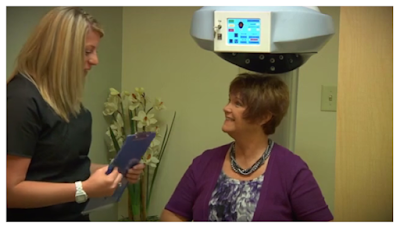Popular Posts
-
Transitions of Indiana is removing the mystery behind this hair restoration process with a new video featuring a client named Brya...
-
Transitions of Indiana is proud to offer Platelet Rich Plasma, the latest scientific development for hair restoration. Both women a...
-
Hair loss is a common challenge that men of all ages face, but finding an effective solution for it shouldn't be so challenging. Se...
-
You've probably seen our commercial about Platelet Rich PlasmaTherapy , also known as PRP Therapy. Its one of the most advan...
-
Transitions of Indiana is happy to announce the arrival of a new Laser Hair Therapy machine. The Sunetics Clinical Laser Unit. Sunet...
-
Transitions of Indiana has been helping people overcome the struggles of pattern baldness, thinning hair and the side effects of chemoth...
-
It’s no secret that men tend to lose their hair quicker than women. There are approximately 35 million men in the U.S. that experience...
-
At Transitions of Indiana, we offer both surgical and non-surgical hair restoration options. One of the most popular non-surgical opti...
-
Welcome to Transitions of Indiana For over 15 years, Transitions of Indiana has been Indiana's most trusted resource for hai...
-
Are you familiar with the term Male Pattern Baldness? Probably so. But, did you know that men are not the only people that suffer from thinn...
Labels
- 2015 hair
- 2016
- 2017
- 2017 Trends
- 99.5 wzpl
- 99.5 WZPL Nikki Reed
- ACell
- alopecia
- alopecia totalis
- alopecia universalis
- androgenic alopecia
- androgens
- ARTAS
- athletes
- autumn
- awareness
- awareness month
- bald spot
- balding
- baldness
- bars
- beauty
- beauty tips
- best results
- best technology
- blow dry
- blow dry bars
- breast cancer
- breast cancer awareness
- breast cancer awareness month
- cancer
- cause
- Celebrities
- Cesare Ragazzi
- Cesare Ragazzi CNC treatment
- Cesare Raggazzi
- cesare regazzi
- chemo
- chemotherapy
- Chicks on the Right
- client reviews
- CNC Cesare Raggazzi
- colored hair
- confidence
- consultation
- cost hair transplant
- crlabs
- curl booster
- cutting edge technology
- dale earnhardt
- damage
- dangerous
- danica patrick
- Dave Gundaker
- david ragan
- dht
- diet
- disorder
- drugs
- dry hair
- dry scalp
- essential oils
- every option
- extensions
- fall
- fantasy hair
- FAQ
- female
- female hair loss
- female hair transplants
- female pattern baldness
- female pattern hair loss
- female patterned baldness
- Finasteride
- food
- food for healthy hair
- foods
- free
- free evaluation
- frizzy hair
- fuller hair
- ginger spice
- grow hair
- Gunner
- hair
- hair and scalp analysis
- hair care
- Hair Clinic
- hair color
- hair cost
- hair costs
- hair facts
- hair grafting
- hair growth
- hair health
- hair history
- Hair Loss
- hair loss all over
- hair loss habits
- hair loss help
- hair loss solution
- hair loss solutions
- hair loss treatments
- hair products
- hair regrowth
- Hair Replacement
- hair restoration
- hair styles
- hair surgery
- hair therapy
- hair tips
- hair transplants
- hair treatment
- hair treatments
- Hair trends
- Hairstyles
- health
- healthy foods
- healthy hair
- healthy scalp
- Heather MacWilliams
- hormonal changes
- hormone
- hormones
- improve
- improve hair
- Indiana
- indianan
- indianapolis
- Indianapolis Transitions of Indiana
- indy
- indy 500
- indy colts
- indy style
- influential hair
- italy
- jennifer jo cobb
- keratin
- kim
- laser
- laser hair
- Laser Hair Therapy
- laser therapy
- laser treatments
- lichen planopilaris
- losing hair
- lupus
- male
- male baldness
- male baldness Indianapolis Transitions of Indiana
- male hair loss
- male hair transplants
- male pattern baldness
- Marketplace
- Men
- men's hair loss
- menopause
- mens hair
- mens hair loss
- mens hair replacement
- millennials
- more hair
- move for movember
- movember
- Mr. Weatherman
- Multi-Unit Hair Grafting
- naaf
- nascar
- natural
- nikki reed
- non surgical hair restoration
- non-medical treatment
- non-surgical hair restoration
- nutrition
- october
- pai
- pai medical group
- pattern baldness
- Paul Poteet
- pills
- platelet rich plasma
- postpartum
- Poteet
- Pregnancy
- prescription
- prescriptions
- promote hair growth
- Propecia
- prp
- PRP treatments
- psoriasis
- Q&A
- reallusions
- reallussions
- receding hair
- regrow hair
- remedies
- results
- results options
- rhonda
- robotic hair transplant
- scalp analysis
- scalp treatment
- scarring alopecia
- sensigraft
- shattered shag
- skin care
- Smiley Morning Show
- Smoking
- solution
- solution for hair loss
- solutions
- spring
- spring hair colors
- stem cells
- stress
- stress related hair loss
- style
- success
- summer
- Summer hair
- sunetics
- testicular cancer
- testimonials
- the crucial catch effort
- the smiley morning show
- thicker hair
- thin hair
- Thinning Hair
- thyroid
- thyroid disorder
- tinea capitas
- tips
- top hair styles
- top mens hair styles
- traction alopecia
- Transitions
- transitions hair
- transitions indiana
- transitions indy
- transitions of indiana
- transitionsindy.com
- transplants
- treatment
- Treatments
- trending
- trendy
- trich
- trichotillomania
- we grow hair
- wegrowhairindy.com
- what is it
- WIBC
- wig
- wigs
- winter
- wish
- WISH TV
- woman's hair loss
- woman's hair replacement
- Women
- women's hair loss
- WTTV
- WXIN











